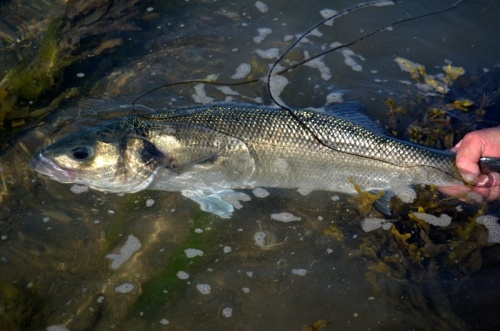National Bass Programme
IFI has established a National Bass Programme to collect data on bass in order to provide scientific advice to support management and conservation of Ireland’s bass resource. Bass is Ireland’s only marine fish species which is managed for angling. The programme is being developed to determine the status of bass stocks and also to improve understanding of their ecology and biology in Ireland for the long-term sustainability of the species.
Contributing to the National Bass Programme
All assistance with the National Bass Programme would be greatly appreciated. If you would be interested in sending IFI bass scale samples, we can provide you with a scale envelope pack.
For further details please email bass@fisheriesireland.ie or call 01-8842600.
All information will be kept strictly confidential.
How to take scale samples for the project
- Please collect scale samples from bass you catch. Scales from all sizes of bass are required.
- Wet hands and equipment when sampling live fish. Place a wet hand or damp cloth over the head of the fish to calm it.

- Scales should be sampled from under the pectoral fin (see diagram).
- Scale sample site see right
- Please use a plastic knife or similar to take up to 5 scales and store scales in envelope provided.
- Measure total length of fish using measuring tape (indicated on diagram).
- LENGTH INFORMATION IS ESSENTIAL – state if centimetres or inches.
- Fill in the date of capture and the location (county and nearest town).
- Fill in weight if possible – state if kilograms or pounds
- Fill in your name and contact number on the back of each envelope.

Please return envelopes to
National Bass Programme,
Inland Fisheries Ireland,
Swords Business Campus,
Balheary Road, Swords,
Co. Dublin.
E-mail: bass@fisheriesireland.ie
Ph: 01-8842600
What to do if you come across a tagged bass?
If you catch a bass with a yellow tag, please don’t remove the tag. Note the code on the tag (e.g. B-00001). If possible take a length and weight of the fish, and five scales from behind the pectoral fin (see link below for more details). Please then release the fish alive! Send us the details, along with the date and location and your name and phone number to bass@fisheriesireland.ie. All information will be strictly confidential.
This information will feed into a national database on bass distribution and growth rates. Your co-operation is greatly appreciated and integral to the project.
Bass and Bass fishing in Ireland
Bass are a southern European species and Ireland lies near the northern limit of its range. They are plentiful along the southern coast of Ireland particularly at Splaugh Rock near Rosslare, Co. Wexford, Dungarvan Bay, Co. Waterford and Youghal Bay, Co. Cork.

Though bass can travel good distances in and out of estuaries, populations appear to be relatively localised. The majority of bass tagged along the Irish coast in the past had not travelled further than 16km from their original spot after as much as year. These localised populations are sensitive to overfishing, so good management of this fantastic fish is vital.
There is no commercial fishing of bass in Irish waters. Anglers are now allowed to fish with a bag limit of two fish per day and fish less than 40cm must be released.
Bass are relatively slow growing fish. A 40cm wild bass may be between 6 and 10 years old. Detailed ageing data was collected for bass during 1978 and the IFI’s National Bass Programme aims to re-energise bass research and update these data sets to better manage bass in Irish waters.


